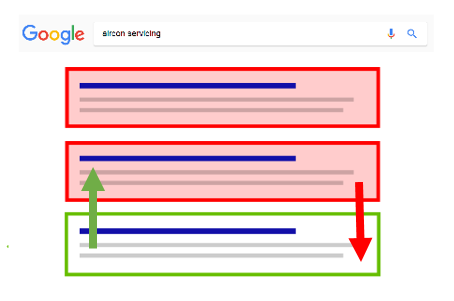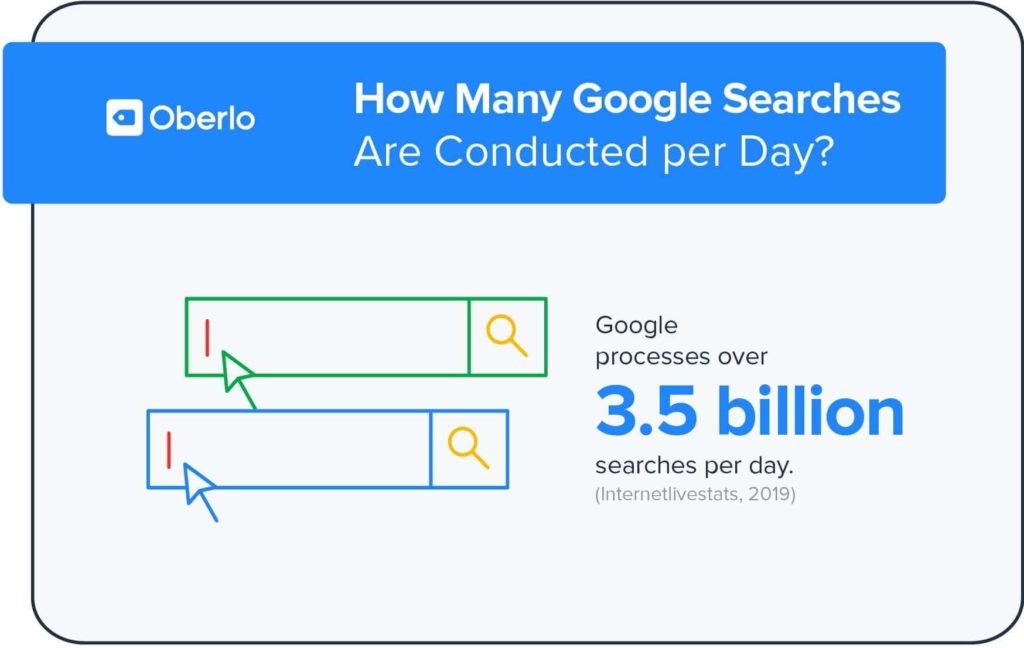
In fact more and more people are using search engines to find answers to their queries. With voice search capability the usage has seen a sharp increase.
Internetlivestats states the average search query per day is about 3,500,000,000 or 3.5 Billion
1,200,000,000,000 or 1.2 trillion per year. This figure was confirmed by Google Zeitgest 2012,
Search Engine Optimization(SEO) is the process of optimizing a website to increase visibility on search engines, like Google, Yahoo and Bing
A report from Brightedge shows SEO or organic search usage and share is outpacing growth in other channels. Optimizing your website for SEO is going to be important in 2020 as organic search continues to outpace other search traffic. The Sad True is most websites have zero or very little traffic from search engine.
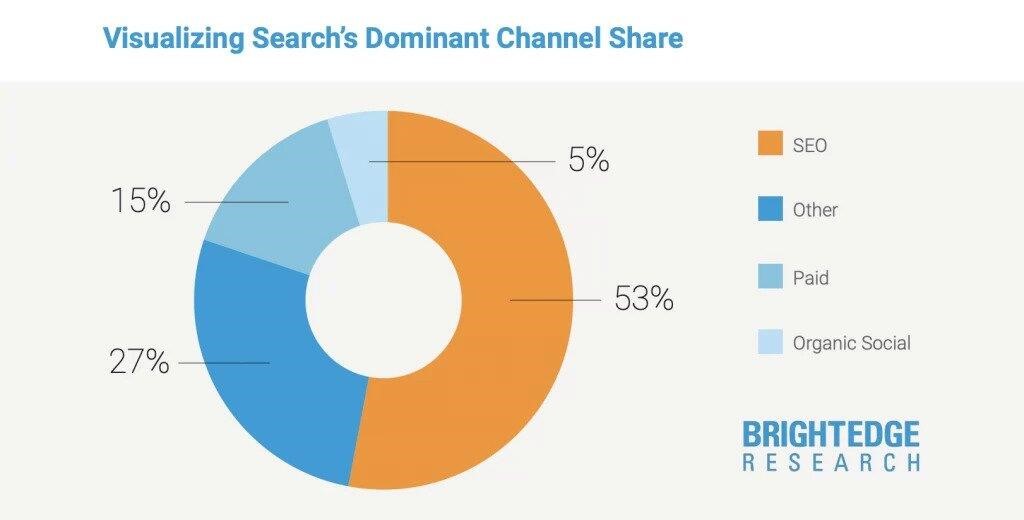
According to recent studies, it has been concluded that merely being on the SERP is not enough; a page has to also achieve high rankings. Philip Petrescu revealed in 2014 the benefits of being ranked higher on the SERP, citing that pages found on the SERP’s first three pages received an average of 76.92%. On top of that, pages which occupied the first spot on the SERP received a third of the clicks. These findings points us in one direction – the undeniable benefits of SEO.
Finding a good Singapore SEO agency may not be a straight forward issue.
They comes in all shapes and sizes from freelancers to full SEO agency.
Beside Local Singapore SEO agencies you have the choice for off-shore agencies too.
Personally working with a Singapore based SEO agency may be a better option as it offers these advantages
Time saving – this is most important commodity in the business world. Time management is less complicated since both of you are in the same time zone. Another plus point is periodical face to face meeting with your is possible and good for in-depth consultation planning with your SEO vendor
Language and Work culture – even most off-shore team speaks English fairly well, you will face instances where single instructions and request may not be understood by your vendors. Having a Singapore SEO vendor also means your vendor understand the working culture like being prompt in working delivery and reporting
Predictability and Stability – Singapore’s internet and electricity services are the best in this region. Outages are not something common, and if there are disruption it is restored quite quickly making sure your SEO work is not hindered.
It depends on which stage you are at
Starting Up – doing SEO for the first time your agency should be competent in:
– Site Audit: or technical SEO, basically it performance a SEO hygiene check to ensure your website is secure, the organization of the website meets SEO best practices
– Site Optimization: make sure your site has sufficient content, and is relevant to the keywords you are trying to rank. Often this will require some minor change to your existing content.
– Keyword Research: the most important of all SEO work, your agency should be able to how research is done, what is their approach and methodology. Done correctly lay the foundation and pave the way for future SEO work
On the Way – already done basic SEO choose agency that can help you with:
– Content Development Plan: able to identify topics that will interest your audience. Write long-form content is the focus, it should contain at least 1,500 words. long-form content using E-A-T make you look like an expert in your field, increase the likelihood of engagement and sharing, improve your ranking
– Linking Building Strategy: this would involve building backlinks to your domain. This progress is where most vendor becomes shady about how things are done. A good vendor will discuss and show you where links are being build and how they are acquired.
– Analytics Reporting: the end goal of SEO isn’t ranking, instead how SEO is traffic is converting. Your vendor should be able to show what is the quantity and quality of the SEO traffic. What is the conversion rate and how to optimize for high conversion.
Monthly Retainer – starts from S$400 – S$2,500 a month, this is the preferred model by most SEO agencies. Work usually covers full scope of SEO work from site audit to link building. Most clients also prefer this model as they can be hands off and have more time to focus on running their core business activities.
Project Base – from S$300 – S$6,000 one time cost, the work is usually for SEO health check audit, consultation and website optimization. The size of the the website is usually the deciding factor as this would equate to the amount of work done. This is usually suited for enterprise sites.
Result Base – cost per keyword ranges from S$300 – S$70 per month, SEO vendor usually only charge when the keyword rank on page 1 of SERP or within the top 10 ranking. This model although seems attractive but carries some risk of using SEO black hat methods to manipulate ranking which will harm your site in all run.
Hourly Base – starts from USD $50 – $200 per month, we are mentioning this in USD as hourly base SEO work is usually offered by off-shore virtual assistance(VA) or freelancers. Upwork or Freelancers.com is a good place to find them. The Quality and performance differs between individual and nature of project, so you need some patience to find the right person.
Do a SEO training course, you can learn thru online class or attend an instructor-led class. If you have no prior knowledge on HTML coding and web hosting I strongly suggest you take the instructor-led classes it will reduce your learning curve by 50%
Read my resource guide on the 3 Best Training SEO Training Class. Most training will cover the following
Keyword Research: This segment covers how to identify suitable keywords, this is foundational to any SEO work. Identify wrong keywords would mean waste of resources. A good learning process should focus on the research methodology instead of teaching you how to use a tool.
On-page/ On-site optimization: Deals with elements on your website, a basic knowledge on front end coding like HTML will be helpful. A good grasp of your wordpress CMS will also reduce the learning curve. It may also cover technical subjects like web hosting and web directory setup. Some refers this to Technical SEO.
Off-page/ Off-site optimization: This section teaches how to build links to your website, probably the most difficult for most beginners as the scope and depth is large. This is an important component.
Reporting and Tracking: Usually covers tools like Google Search Console which will show ranking performance. Some providers will also cover basic Google Analytics.

The Google Webmaster Guidelines contains 200+ signals that help Google find, index, and rank your site. We can divide the signals into 3 main categories, we called it the 3 R Ranking Signal
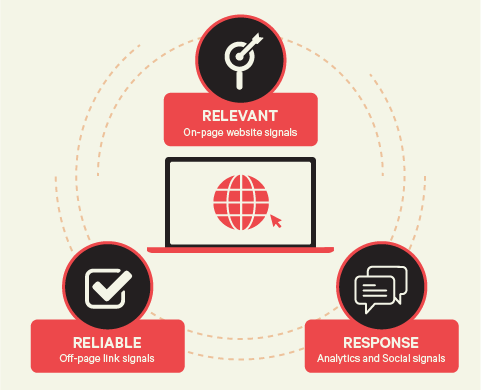
When a page is evaluated for relevance, Google searches for clues that indicate that your page has answered the search query that has been entered by the user. This is largely determined based on the content produced by the site.
Generally, quality content is developed for the benefit of the reader. They are done through careful and thorough keyword research to shortlist and identify what their readers need and are interested in. By anticipating what your readers want to read and creating content around it, it increases the chance of your page being displayed when a search is entered. The creation of relevant content also helps to retain readers, promoting further engagement and potential conversion with your site.
Google’s Search Quality Evaluator Guidelines give us important information on how Google determine what’s quality content. These guidelines are used by human evaluator and were developed to complement the algorithm to rank pages with quality content more accurately.
According to Section 3 of the guideline a good quality page should have these factors:
1. The Purpose of the Page – this is the first step, the important point is there should be sufficient amount of main content (MC) to provide answers or solutions relating to the page purpose.
For example if the page purpose is about staycation in Singapore, the content should have good comprehensive information on hotels, transportation, place of interest etc.
2. E-A-T – Expertise, Authoritativeness, Trustworthiness. Having enough MC is not sufficient, Evaluators use E-A-T: Expertise, Authoritativeness, Trustworthiness to further determine the score.
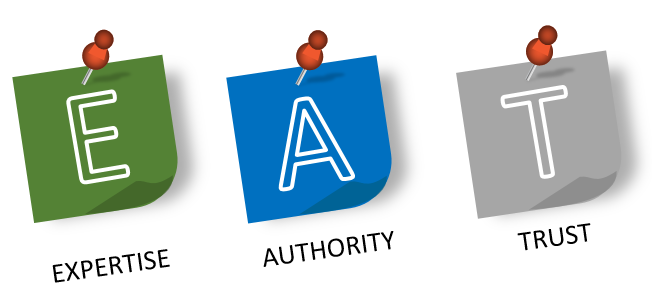
On being the expert and authority Google lay out some specific in section 3.2. Depending on the page purpose the “expertise” is define differently.
For example, if the page is writing on financial analysis the expert would need to a certified analysis. However if the page is a forum page on financial matters Google can accept life experiences as subject expert,
Besides doing keyword research, webmasters can also improve their page’s relevance by optimizing the SEO on-page factor. These factors are ranking signals found on the page itself. Some examples of on-page factors are title tag, meta description, and anchor text. Anchor text is the keyword you are looking to rank.
A page’s reliability is measured based on the backlinks a page accumulates a backlink, or a link that is found on a site beside yours, is viewed as a referral or a vote of confidence for your site. Just like how a brick and mortar business rely on word-of-mouth recommendation to establish themselves as a trustworthy business, websites too rely on backlinks to establish themselves as an authority in the industry. Acquiring backlinks is one the most important SEO ranking signal.
To achieve reliability, a webmaster need to look into the development of their site’s link profile, that is the composition of links that are directed to your site. As your link profile grows, it indicates to Google that more webmasters in the industry are quoting you in their own article. This reinforces the trustworthiness of your content, boosting your site’s reliability.
Establishing your site as a reliable site is not only about accumulating large number of links, it also includes the acquiring of quality links. The ability to find the balance between quantity and quality is the key for creating a healthy link profile. Having a healthy link profile improves Google’s impression on your site, viewing it as more trustworthy and credible.
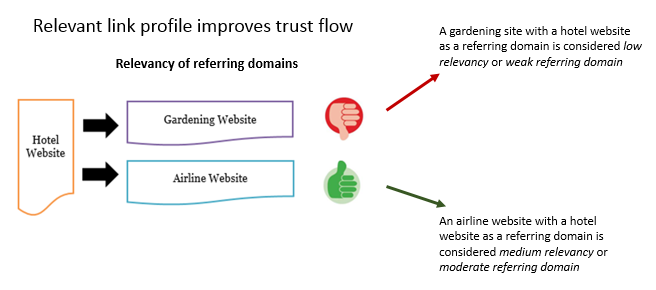
A user’s response to your page can be measured using analytic metrics. A common tool used by local webmasters is Google Analytics. By analysing and interpreting these metrics, you will be able to determine which page is well-received and which page is struggling to keep visitors interested.
On top of being a search engine, Google is also a business. Therefore, it is Google’s natural aim to ensure that their users are satisfied with their services. This is evident through their continuous efforts to improve the quality of pages displayed on their SERP. Google does this by analysing a site’s analytic metrics. If a site is found to have low engagement behaviour, it signals to Google that the site has little value to offer and therefore should not be ranked highly on their search listing.
One of the metrics that webmasters should pay attention to is bounce rate. Bounce rate, which measures the percentage of visitors that leave your page without further interacting with your site, is usually a strong indicator of a page’s quality and relevance. Typically, a page whose content is irrelevant to the keyword it is ranked for tend to experience high bounce rates.
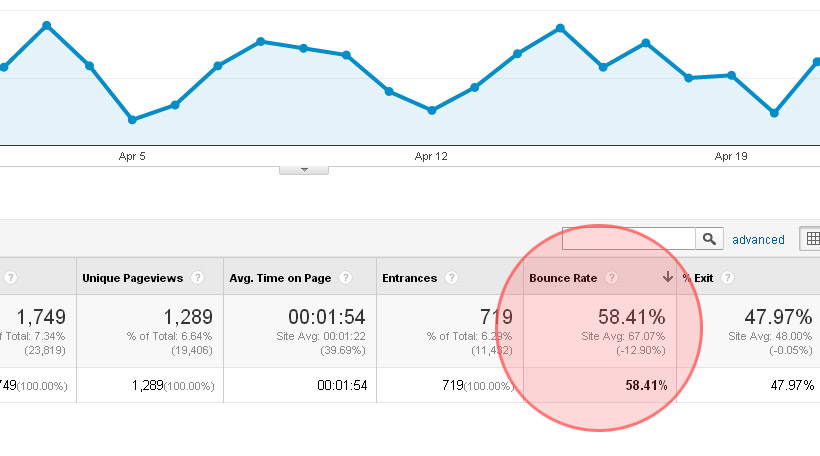
Imagine that you are searching for air-conditioner services around your area and you key in the search term “aircon services” into the search query bar. You, like most users, click on the page ranked first. Even though you have found the site relevant to your query, you quickly hit the back button and return to the SERP. You then go on to click onto the page ranked second.
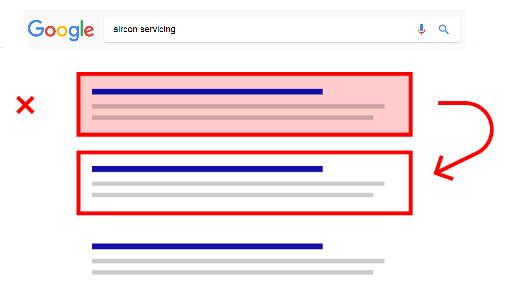
Skimming through the second page, you remain unconvinced and decide to hit the back button, returning to the SERP. You move on to the next result and click on the page ranked third.
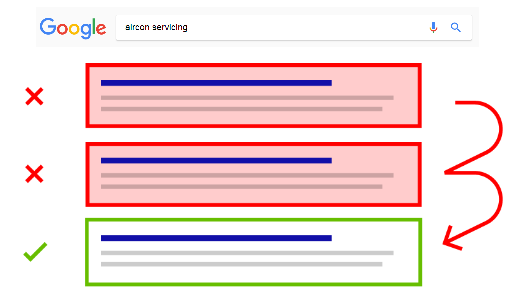
On the third SERP URL, you did not hit the back button. Instead, you stay on the site for a minute. This behavior informs Google that the third page is the best match for you. If this behavior is observed over a period of time, the third page will gradually start ranking higher, while the second page observe a decline in ranking.
